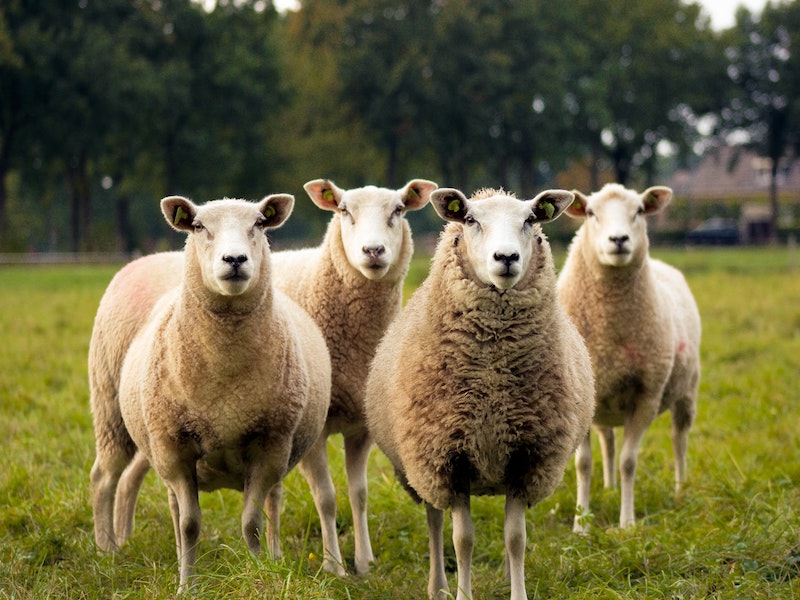The word ‘sheeple’ is used so often it’s become an official word in the Oxford dictionary. A ‘sheeple’ is docile, foolish and easily led. They are people who conform to the herd and abide without question. The thing about the word that I’ve always found a little odd is that referring to people who don’t question the world as sheeple misses the point.
Society sustains itself because the majority conform. Otherwise, a functioning society wouldn’t be possible — and it’s hard to imagine many people believing we would be better off without society.
While individualism is encouraged, the reality is that we have a strong desire to be like everyone else. Sure some critical thinkers question the world around them, but if everyone challenged norms, then a social system could never be maintained.
While for a few, it is frustratingly obvious that society is functioning in a dysfunctional way, I find the idea of every man for himself in some dystopian neoliberal dream world far less appealing.
The irony is those who claim others to be sheeple are sheeple themselves. The term ‘sheeple’ is merely a noun that mocks natural social behaviour. People do what other people do. Just like sheep in a herd do what other sheep in a herd do.
We are all stronger working together. If every man were truly an island, the world would be an abominable place to live. Chaos and anarchy would reign supreme.
The bad side of being sheeple
The bad part about our desire to conform is that social norms have such a powerful influence over our behaviour that we will continue to conform to norms regardless of the outcome.
You would be hard-pressed to meet anyone who would say they want to destroy the natural world, and yet, our behaviour and the beliefs that we all conform to are the causes of the climate crisis.
But we can’t function outside of the norms within which we live. So even though (most) people know our behaviour is leading us towards a terrible future, we can’t stop doing what we do.
We have unintentionally designed society to be at war with nature. Not a war in a literal sense, but the beliefs and rules of society mean we all behave in ways where it would seem as if we are trying our best to destroy the natural world we depend on for life itself.
What makes us go ‘baaaa’
One of the major forces triggering the climate crisis is that our lifestyles revolve around consumption. Buying stuff is what makes everyone go ‘baaaa’.
The issue is that consumption is highly energy-intensive. To make the products we all desire, you need to transfer energy from the Earth into the goods people buy. You also need electricity to make the goods, and the goods then need to be shipped, flown or driven to their destination.
79% of global energy demand is generated through fossil fuels. When you transfer the energy from fossil fuels into the products that we buy or use for other services such as transport, or electricity production, carbon dioxide is released into the atmosphere.
To put it simply, a consumption-fuelled lifestyle is one of the main reasons carbon emissions continue to increase when we know emissions need to decrease. Our energy demands continue to go up, which means carbon emissions inevitably increase to meet the increasing demand.
The challenge we face is that as more and more people join the global middle class, more people have the ability to lead a western lifestyle driven by consumption. When you consider the global middle class is set to reach 5.3 billion people by 2030, you come to realise the enormity of the problem we face.
Habitat
This isn’t the only issue.
We need more and more of the Earth’s habitat to provide the goods and services of a growing population. But other forms of life live on that land. If we destroy the habitat, we also destroy the life that lives in the habitat. That life has a connection with the natural world and is vital in maintaining the health of ecosystems.
By destroying the ecosystem, you destroy the fabric of the natural world that is integral to sustain the environments natural balance. We are severing links, and we have no idea of the impact of doing so.
The result is that while humans make up 0.1% of all life on Earth, we have destroyed 83% of wild animals.
This cycle of destruction can’t continue forever.
We already need 1.75 Earths to sustain our current lifestyles. If current trends continue, we will need 3 Earths by 2050.
I don’t know about you, but I’ve never heard of or seen a couple of Earth-sized planets forming around us. We only have one Earth, and so it seems obvious we can’t continue on the path we are on.
A trap of our own making
Knowing all of this does nothing to change the fact people will continue to conform to norms that are leading us to environmental disaster.
It seems we can’t live without each other, but we also can’t live with each other.
As a result, we find ourselves in a trap of our own creation.
If it is the beliefs of society that are triggering catastrophe, then those beliefs need to be reshaped. But if you reshape the beliefs, then you change the way society functions. And if you change the way society functions, then the norms we all conform to will also change.
The ‘sheeple’ (society) will no longer know how to behave because society’s norms will change to such a degree that what was normal is now abnormal.
Perhaps more importantly, the elite gain their power, wealth and legitimacy from things as they are now. The elite has everything to lose if the social construct changes. And because they are rich and powerful, they have the resources to resist change.
What’s the solution?
The challenge we face then is how do you get from A to B? On top of this, what does B look like? Having a destination in mind certainly helps if we want to get out of the mess we find ourselves in.
In terms of getting from A to B, if everyone conforms to the norms as they are now, and the elite has no interest in change, the idea that we can transform society at the click of our fingers seems absurd.
It is an inconvenient truth that the only way society has transformed in history is through social breakdown, in the form of revolution. It is in a moment of revolution where a new order replaces the current order of things with new ideas and new ways of doing things.
If the revolution is successful, then new ideas will start to form the basis of society. Once they do, society begins to orientate around these ideas. New norms are formed, and those beliefs start to shape society. It is a highly disorientating and chaotic moment. That’s why revolutions don’t happen all too often.
No one likes wholesale change because there is no guarantee life will be better off after the upheaval.
Problems getting from A to B
The idea there is going to be a social revolution on a global scale feels unlikely. There are two reasons why. Firstly, free-market capitalism has become the dominant ideology of the world economy. Its dominance feeds into the second issue; there is no compelling alternative to how we do things at present.
There is no ‘B’ — we don’t have a destination we are aiming for that provides a compelling vision of a new society that works in harmony with the environment.
As there are no visions, there is no ideology for those who are disillusioned with the current system to stand and unite behind.
The dilemma we find ourselves in is that remaining in ‘A’ will lead to environmental destruction and the collapse of civilisation. But due to the nature of society, no one wants to go to ‘B’. What makes that eventuality even more unlikely is that no one knows what ‘B’ looks like.
The dilemma is that we have no other option but to trigger wholesale social and economic change. If we don’t, the environment around us will transform, and we will be forced to adapt to the changes when it does. Either way, the current social norms that dominate are not going to last. That is something you can be sure of.



